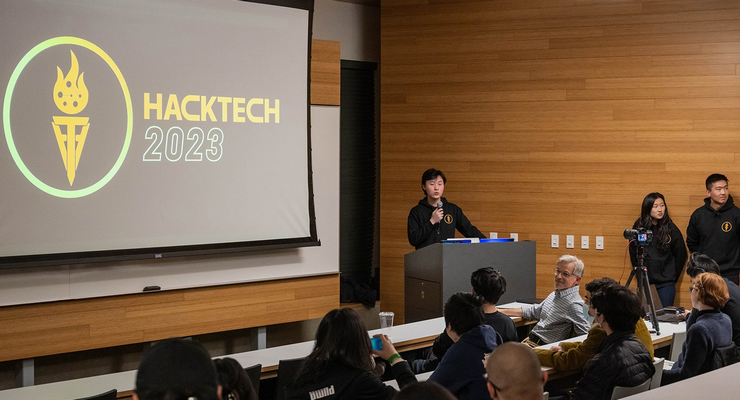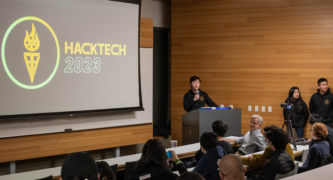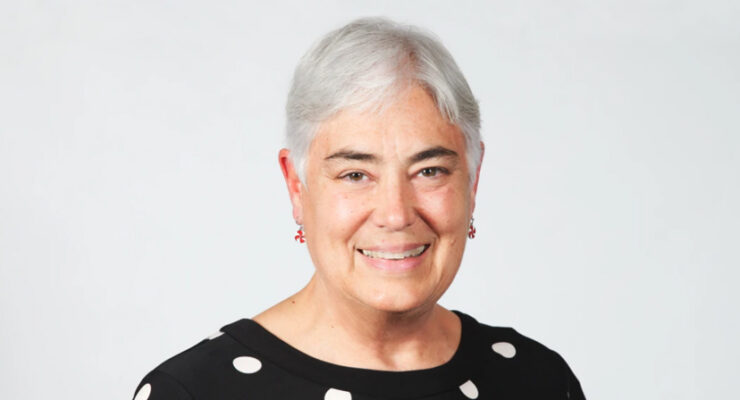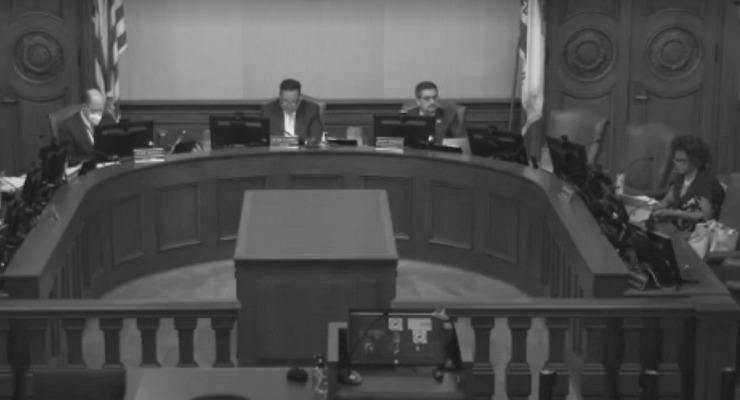
A web app that connects users with local tailors to extend the lifespan of their clothes. A sustainability-focused news aggregator that uses AI to summarize articles. A machine learning model that predicts the most efficient locations to place solar panels. These are just a few of the projects students created in 36 hours for Hacktech, Caltech’s annual intercollegiate coding competition.
Organized by a team of Caltech undergraduates, Hacktech returned for a ninth year from March 3–5, 2023. During the hackathon, more than 400 participating students conceived and developed projects to address issues in sustainability.
Several dozen students from USC, UCLA, the Claremont Colleges, and Caltech attended events on campus while many others joined Hacktech remotely from around the world. In total, over 53 universities across 10 countries were represented. Los Angeles-area high school students also joined the hackathon virtually.
During the event’s opening ceremony, Jonas Peters, Bren Professor of Chemistry, and director of the Resnick Sustainability Institute, told hackers their knowledge and abilities are well suited to assist in reversing anthropogenic climate change.
“There are countless ways to apply your quantitative skills towards issues in sustainability,” Peters shared. “So many that I didn’t know where to begin, so I asked ChatGPT what to say.”
Peters listed off ideas from the AI chatbot’s response: using machine learning and software to optimize energy and resource management; data analytics for climate modeling; and developing better agricultural systems.
“It’s not all cryptocurrency and Twitter,” Peters concluded. “Do stuff that really counts.”
For the rest of the weekend, students took Peters’ advice to heart and set out to tackle global problems in sustainability.
Caltech first-years Daniel Khalil, Christina Liu, and Mark Hu created SolarSense, a project to optimize solar energy generation. The students built and trained a machine learning model to predict various solar indicators and locate the most efficient spots to place solar panels. For their work, they won the “Best Use of AI/Machine Learning” distinction and $500.
Throughout the weekend, hackers also attended talks from distinguished guests including Tammy Ma (BS ‘05), lead of the Inertial Fusion Energy Initiative at Lawrence Livermore National Laboratory, who recently oversaw the first nuclear fusion reaction to produce net-positive energy; Kevin Noertker (BS ‘09), co-founder and CEO of Ampaire, which develops hybrid-electric airplanes; and Kip Thorne (BS ‘62), Richard P. Feynman Professor of Theoretical Physics, Emeritus, and recipient of the 2017 Nobel Prize in Physics for his role in founding the Laser Interferometer Gravitational-Wave Observatory (LIGO) and detecting gravitational waves for the first time.
“We wanted our invited speakers to teach the hackers something new, get them excited for the future of sustainability, and maybe even inspire them to go out and build their own start-ups,” says Aaron Zhao, director of sponsorship and finance for Hacktech. “They were also all really incredible people to meet!”
After a marathon of speaker sessions, networking, and coding, hackers submitted their projects at 9 a.m. on Sunday, March 5. Submissions were judged by Ma, Noertker, and other technology and software professionals who reviewed for four criteria: impact, feasibility, prototype, and presentation. Well-conveyed projects that delivered technologically innovative and effective sustainability solutions were considered for several categories of prizes adding up to $10,000 total.
Upcycle, a web app connecting users with local tailors to mend and upcycle their old clothes, won the $5,000 grand prize. Created by four hackers around the world who had never met before Hacktech, the project incorporated many features including a marketplace to browse nearby tailors, a map to locate recycling centers, and an in-app messaging function. It also integrated an AI feature to help users ideate new fashions to upcycle their clothes into.
“We really wanted Hacktech to foster interaction and connections between students,” says Zhao. “The fact that the winning project was created asynchronously by four students from different colleges (and time zones) in California and India highlighted that. Hacktech is proof that it’s possible to come together with nothing and build something incredible.”
Hacktech was organized by Caltech second-year computer science students Mila Hong, director of logistics; Andrew Huang, director of hacker experience; Roy Jiang, director of marketing; and Aaron Zhao, director of sponsorship and finance. They said they intend to hold the competition again in October 2023 to align with the tech industry recruitment cycle and provide an opportunity for newly admitted first-years to get involved at Caltech.














 0 comments
0 comments


